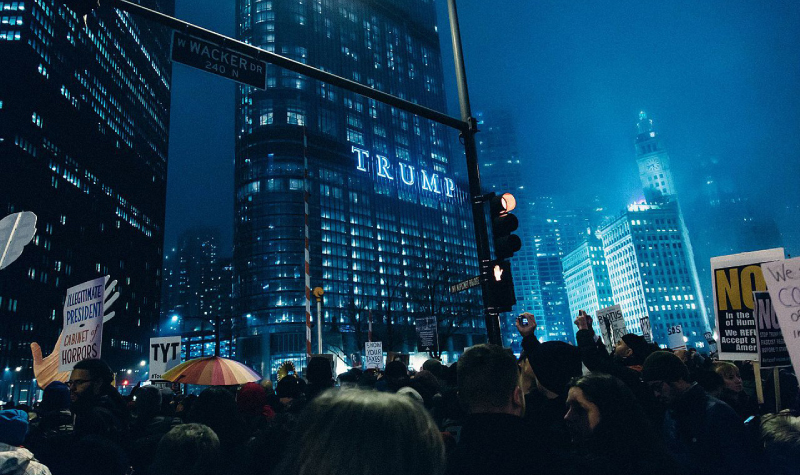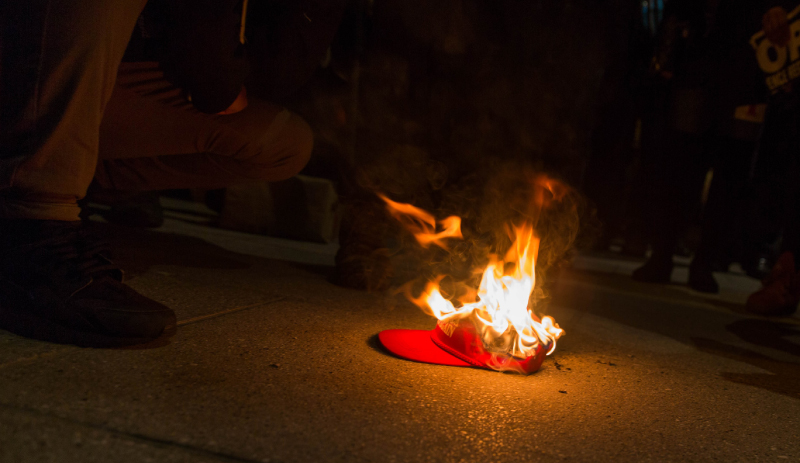
Appears in The Wayfarer, Spring 2017 Issue (Vol 6. Issue 6) | Visit Store»
by Theodore Richards
I awake to the peaceful babbling of my one-year-old daughter. I am surprisingly well rested, considering the fact that I finished off a whole bottle of wine the night before. I never sleep well when I’ve been drinking. But this is odd. I awake without remembering—either my dreams or the night before.
Like a man who has done some regrettable things but remains blissfully unaware.
The three-year-old comes in next, bouncing as she does. Then the 8-year-old. I am fully awake now. All my girls are here with us in the bed. I start to remember. I did not say anything inappropriate or throw up on the couch. My wife checks her phone quickly. I know she hopes she will find some miracle there, but she doesn’t. “I have some bad news,” she says to my eight-year-old daughter. And we begin to describe the world as it is.
We awake to streets on fire. Chicago is burning; Oakland is burning; New York is burning. On college campuses and in rural places white men scream racial slurs at black people; white children chant “build a wall” at crying Mexican children. Muslims stay home. I am getting texts from kids who’ve been abused at school.
We have elected a fascist president.
It is a warm and sunny day for a Chicago November. It will probably be the warmest on record. It will probably be the warmest year on record. Protests rage over the Dakota Access Pipeline at Standing Rock. Forest Fires burn Appalachia. We have elected a president who says climate change is a hoax, who promises to extract everything he can for profit. The Earth is on fire.
We have elected a reality TV star as president.
We are so tired. But my daughters need their breakfast.
Scene 1: Mt Greenwood, Chicago
Kofi Ademola Xola is one of the leaders of Black Lives Matter Chicago. He spends many of his days in the streets protesting. The protests, in Chicago at least, have largely been met with a combination indifference, annoyance, and solidarity.
I worked with Kofi for two years. He ran our community garden project first, and later became one of our teachers. If you were to ask me to describe him, I would say that he is a calm and thoughtful person, able to skillfully navigate the challenges of community work.
All of the Black Lives Matter protests and actions are peaceful. A few days before the election they responded to a black man being killed in the Mt Greenwood neighborhood of Chicago. This was no protest; it was merely an effort to be present for the family of the slain and to bring attention to the fact that he was killed. They came to assert that this death is not a trivial thing.
In part due to the success of the movement, the phrase “black lives matter” has become so common we no longer think about what it means. It is a profoundly mundane and uncontroversial statement, suggesting that a black life is worth as much as any other life. The common retort “all lives matter” is nonsensical. Of course they do. No one ever suggested they didn’t. Why, however, is it so controversial to suggest that a black life matters?
For those who don’t know, Mt Greenwood is a notorious place in Chicago. It is an Irish neighborhood known as the home of many cops and famous for its enduring racism. I’ve never been there, but my wife grew up not far from there and spent much of her childhood running from white kids calling her nigger.
As for myself, I confess to living in a bubble. I am always surprised at the awfulness of people to one another. A few years ago we attempted to start a program for Chicago teens in a small town in Michigan called Baroda. Things were going great. We brought young people to learn about agriculture, to camp. But then the emails started. The harassment. The town of Baroda got together, got organized. They weren’t going to tolerate this intrusion on their space. Our kids were criminals, they said. And worse.
I didn’t know then that I was witnessing something more than the last cries of a dying America. I didn’t know then that I had a special insight into the White Rage that would eventually elect Trump.
So on this day, on the eve of the election, when Kofi and his people arrived to comfort the dead, to ask questions of those who were there, they were met with flag waving residents chanting CPD and telling them to go home. As if Chicago weren’t their home. They were waving American flags. As if African Americans aren’t American.
Something was in the air.
* * *
People in Chicago know that this episode was nothing new. And at the same time, it bubbled up at a particular moment, a moment that appears to be significant in American history.
This is Chicago. Trump was chased away from this city months before—many of the same people who came to Mt Greenwood chased him away. He’s spoken about Chicago regularly. “The blacks” of Chicago have nothing to lose since their lives are so miserable, he said. Why not vote for him? Of course, Trump knew he’d never get their votes. The common perception was that he was trying to get the white “moderate” vote by easing their fears about his racism. But those who understand White America know better. He was sending a different message to White America: Be Afraid.
One thing that is clear from the perspective of the South Side of Chicago is this: To ignore the White Rage and to pretend that only economic issues led to Trump’s election is a profoundly ahistorical approach. American populism has always appealed to the scapegoating of Black America. To ignore this fact would be to act as many Germans did in the twenties and thirties in suggesting that the Nazis really weren’t so bad, that once Hitler fixed the economy the anti-Semitism would go away.
As if European anti-Semitism were only a passing fad.
It would be akin to what the moderates did during 60s when they said that the Freedom Movement was moving too fast in asking for education and voting rights. It would be akin to those who suggested that white southerners had suffered enough during the civil war, losing their slaves and all, and shouldn’t be expected to lose white supremacy, too.
History teaches us that we are all, always, within a hairs breadth of complicity in genocide. It’s not that there are evil people; it’s that evil things can happen if they aren’t named and confronted.
And so it would also require us to ignore history to not see what happened in Mt Greenwood as the harbinger to Trump. When Black people try to get free in America, white America turns to fascism.
There is a strong sentiment that the left must learn to listen to the Trump voter. We’ve ignored his legitimate economic concerns; we’ve projected onto him a simplistic caricature of ignorance and racism. I, for one, struggle with being compassionate to the Trump voter. The hate isn’t imagined. But, at the same time, their struggles are legitimate. And certainly the working class person who is duped into Trumpism isn’t the real enemy. But how exactly does one practice compassion to someone who wants to uphold white supremacy? In today’s feel-good world we don’t want to do the hard work. Easier to take a pill than deal with what troubles us. Easier to say “let’s all get along” than confront injustice. Neither King nor Gandhi ignored the very real hatred of those who opposed them. Loving someone doesn’t mean you can’t tell them they are wrong. Perhaps it requires it.
Scene 2: Election Night
My phone is buzzing. Texts are coming in. These are young people, college and high school students.
“I am afraid he’s gonna win”
It’s early, I say. They are still counting votes.
“I’m so scared.”
It isn’t over yet.
“There is someone shouting ‘make America great’ outside my window. He raped my friend last month.”
…
“What are we gonna do? I am so scared.”
We’ll make it through this.
…
“There is a truck with a confederate flag parked outside. They are shouting at us”
Call the police.
“How could this happen?”
…
* * *
Why?
I thought I had to say something, explain this to my daughters, my students, my readers. My self.
Even though we would later find out that he received over two million fewer votes than Hillary Clinton, even though it was only the fraud of the electoral college that gave him the White House, it still boggles the mind: Over 60 million people voted for an incompetent, mono-syllabic, crooked, openly-racist, reality-TV star for president.
Why?
The two narratives that compete really ought to not be in competition. Both are true. The first is that America has a lot of ignorant and racist people. We’ve failed to educate people. We’ve failed to counter the narrative that placates and accommodates the entitlement of white supremacy. And most of us get our information through social media.
The second narrative requires a little more thought, however. This is the narrative in which the Democrats are as much to blame as the Republicans. It begins with Reagan. It begins with the shrinking middle class in America. And it picks up steam with the 90s Democrats, chiefly Bill Clinton.
The planet is finite and the possibilities for growth—and growth at all costs is a requirement of Capitalism—are shrinking.
So the conventional wisdom of our politicians has been to turn toward Globalization and neo-liberalism—an economic philosophy that allows for continued growth and wealth for those who can get in on it, but also creates growing gaps between rich and poor. The factory jobs of the post-war era are leaving; the coalmines are closing.
The Democratic candidate had no real answers for this.
The Republican candidate had answers, facile and duplicitous as they may have been: it’s the Blacks, the Muslims, the Mexicans. We might as well throw in gay marriage while we’re on a roll. And, of course, we’ve even gone back to blaming the Jews.
We’ll take care of them for you and bring the jobs back.
It’s easy, of course, to criticize such demagoguery, just as it’s easy to criticize the racism of the Trump voter. The criticism is true and valid and must be heard. But it’s harder to figure out how to create an economy that works for everyone and doesn’t destroy the biosphere.
When we put the election in terms of the stark political and economic realities for the people, I feel like I need to re-ask who really won the election. I don’t mean who got more electoral votes, or actual votes. The great irony is that for all the talk of Trump as an outsider, it is clear that his victory ensures the continuation of the global economic system that renders all life on the planet—certainly this includes the working class people who voted Republican—losers.
Of course, to pretend that the only issue was the economy is to engage in the dubious fiction of ignoring black and brown people. That is, the narrative that Trump’s election is one in which the poor masses rise up against the “coastal elites” only makes sense if one only includes white people. This is the sort of populist narrative from which genocides are brought forth: to eradicate a people, one must first pretend they were never really there.
Scene III: Wellesley
There is a pickup truck parked in front of Harambe House, and the young women inside are scared. Wellesley is all the things from which the country is going to be “taken back”: intellectual, progressive, LBGTQ friendly. It’s a women’s college. And this is the black student center. A perfect storm of Trump’s list of why-america-isn’t-great-anymore. Fascism requires enemies; this is its gift.
Serenity Hughes is one of these young women inside. She is the first person in her family to go away to college. She isn’t part of those elites we hear about all time. I have known her pretty much since the day she was born; I can recall biting the skin off of apples and feeding them to her as I carried her in my arms. She is a black girl from the south side of Chicago who was bright, ambitious and hardworking enough to get her self into an elite school. But that doesn’t matter to the two young men—boys—who show up to harass the black women of Harambe house.
They shout some things, then depart “peacefully” when security asks them to leave. Blissfully unaware that their whiteness is probably the reason they weren’t arrested in the first place, they return, spit on some girls, shout more slurs, then leave.
We know who they are because they bragged about their escapades on social media. But there were no consequences.
They are taking back our country.
They are making America great again.
Never has it been clearer from whom it is being taken back or to what past greatness it is returning.
* * *
As my daughters get ready for school, I realize I have nothing to say. What explanation is there for such things? For the awfulness that humanity, at times, displays? We think, somehow, that because people do it, there is an explanation that makes sense to other people. Is there really an explanation for the interahamwe or the Nazis—for Trump—that makes more sense than, say, an earthquake or a tsunami? This is not to take away the significance of human agency and responsibility. Such events are chosen and preventable; this makes them different from natural disasters. But that doesn’t mean they make any more sense.
My wife drives the two older girls to school. First she drops off the three-year-old at her Jewish pre-school. I am not Jewish, so maybe I am naïve about such things, but it seems to me that it must be astonishing to American Jews that there are Nazi-sympathizers in the White House in 2016. Then she takes the older one, who goes to a progressive, multi-cultural school. Montessori. It had been so easy, in such spaces, to think that things had changed.
Is it possible that all the fear and anxiety over Trump’s presidency is because it forces us to deal with things as they really are? We can no longer pretend that we don’t have to deal with climate change or that technology will save us. We can no longer pretend we live in a post-racial society. We can no longer pretend that we haven’t dumbed-down our society to such an extent that celebrity is more valued than substance.
We’ve got work to do.
At home, I play the drums with my one-year-old. There is, of course, nothing to explain to her. She’s one. I feel a certain sense of relief; for I have no explanation anyway. This seems like the time to make music and listen. And as soon as she finds the words, she will explain things to me.
This isn’t the time for the father to tell the little girls how things are.
In the meantime, it also isn’t the time to keep quiet. There is music to make. There are poems to recite. Books to write. Communities to build. These things—not the Democratic Party—are the opposite of fascism.
We’ve got work to do.
 Theodore Richards is a philosopher, poet and novelist. As the founder of The Chicago Wisdom Project, editor of the online magazine Reimagining: Education, Culture, World, and a board member of Homebound Publications and the Fox Institute, his work is dedicated to reimagining education and creating new narratives about our place in the world. He is the author of five books and numerous literary awards, including two, Independent Publisher Awards and a Nautilus Book Award. His next book, The Great Reimagining: Spirituality in an Age of Apocalypse, is scheduled for release in 2017. He lives in Chicago with his wife and daughters. | Photos: Burning of Make America Great Again campaign hat after sunset January 19, outside the NPB. Photograph of Lorie Shaull; Trump Protest Chicago Photography Unknown
Theodore Richards is a philosopher, poet and novelist. As the founder of The Chicago Wisdom Project, editor of the online magazine Reimagining: Education, Culture, World, and a board member of Homebound Publications and the Fox Institute, his work is dedicated to reimagining education and creating new narratives about our place in the world. He is the author of five books and numerous literary awards, including two, Independent Publisher Awards and a Nautilus Book Award. His next book, The Great Reimagining: Spirituality in an Age of Apocalypse, is scheduled for release in 2017. He lives in Chicago with his wife and daughters. | Photos: Burning of Make America Great Again campaign hat after sunset January 19, outside the NPB. Photograph of Lorie Shaull; Trump Protest Chicago Photography Unknown

To bring each issue of The Wayfarer to fruition, it takes hundreds of hours each season to craft, edit, design, and distribute the journal. If you find joy and enrichment within our features, please consider becoming a supporter with a small donation. There is no set amount. Whether it is .99 or a few dollars, we appreciate any gift you care to give. While at this time we are not a non-profit all donations do go towards ensuring the future of the journal.

